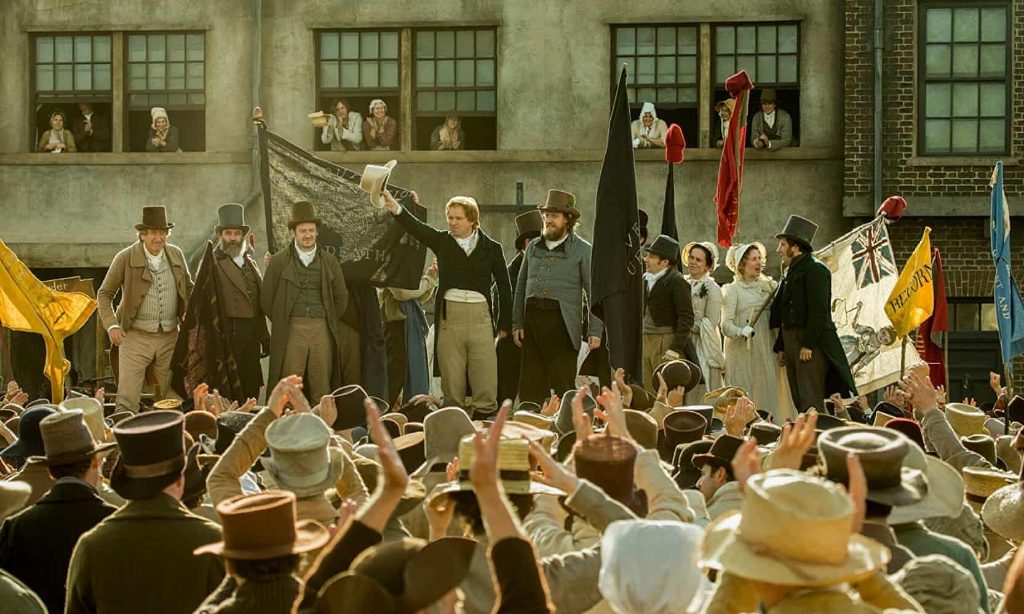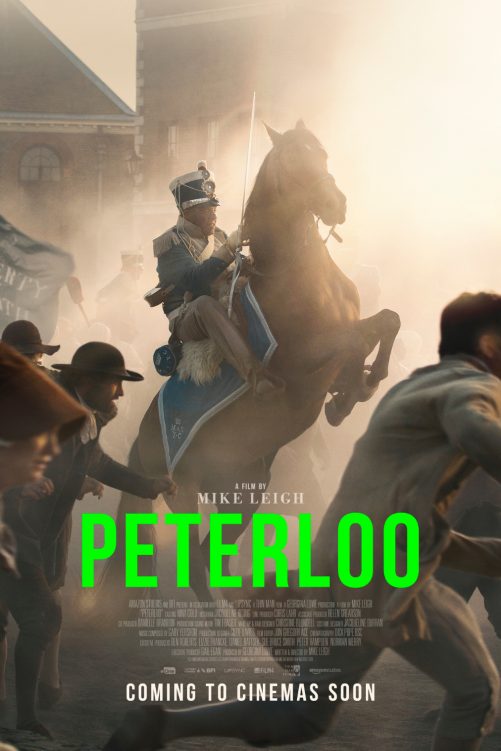Peterloo

Bringing factual and revolutionary working class politics to the fore, period drama specialist Mike Leigh presents a feature film that raises awareness of a tragic event that is seldom the topic of discussion in history classrooms across the United Kingdom. In the aftermath of the Battle of Waterloo, the societal divides that had already been under the immeasurable strain of the Napoleonic Wars neared an ultimate breaking point. With the north of the country feeling these pressures the greatest, calls for reform grew louder with each passing day until finally they capitulated on the 16th August 1819, when 60-80,000 peaceful protesters united at St Peter’s Field, Manchester, to listen to great radical orator Henry Hunt call for parliamentary reform and representation. However, as Leigh’s Peterloo aptly illustrates, what followed proved to be a bloody exchange, with a less than benevolent conclusion.
Choosing to place greater focus on the politics of the time, the people and growing unrest prior to that fateful day, Peterloo follows the political unrest stemming from mill owners cutting workforce pay and the Corn Law bread taxation, implemented to fund the British efforts overseas. Among the disgruntled is Joseph (David Moorst), a bugle boy suffering from PTSD following his presence at the Battle of Waterloo, and his labouring family, including his reformist father Joshua and mother Nellie (Maxine Peake), who is more than cynical about the yearned-for success of the cause. The family attend radical gatherings where community figures continuously stand and speak, steadily building the tensions and upheaval well beyond the film’s opening hour, and, although Leigh does not choose to develop any individual characters extensively or emotionally through his script, the dialogue is beautiful written, with poignant context fastidiously delivered by each and every cast member – none less so than the omniscient Henry Hunt, played by the bellowing and illustrious Rory Kinnear. The varying dialects expand the array of cast members to a behemoth level that is supported by cinematographer Dick Pope’s wide frames of vast green Lancashire landscapes, eventually brought together into a finale of massive proportions, both visually and in a very real context.
It becomes fairly evident before too long that Peterloo is a movie about the people who worked so hard for so little in return, rather than the Peterloo Massacre itself, with all of two hours of its 154-minute run time passing before our characters begin their march on Manchester. Yet the film refuses to shy away from the reality of the slaughter once the cavalry charge commences, albeit portraying the gruesome affair tastefully to fit its 12A certificate. The feature benefits from its casting, with each face suiting their character to the core and carrying the sometimes monotonous speeches through to a close with authoritative conviction.
With the financial backing of Amazon Studios, the opportunity to build digitally enhanced crowds injects an even grander sense of occasion and size to the hectic event on display, placing greater emphasis on how devastating and terrifying an ordeal the massacre would have been. To the historically intrigued mind, the ambling, repetitive speeches may prove to be engaging viewing and rightly so given the powerful connotations associated with the political language, however, the run time does make the film a slight dirge to endure, with some scenes providing little relevance or progression to the story arc.
Peterloo is a brilliant depiction of an incident that has been well forgotten or not even learned of in schools, but Mike Leigh’s project is ultimately a finely spread Marmite of a film, burning slow until a striking climax. Moviegoers will either love it or hate, but do go see it for an important and relevant history lesson given that 2019 will strike the massacre’s 200-year anniversary.
Guy Lambert
Peterloo is released nationwide on 2nd November 2018.
Watch the trailer for Peterloo here:

























Facebook
Twitter
Instagram
YouTube
RSS